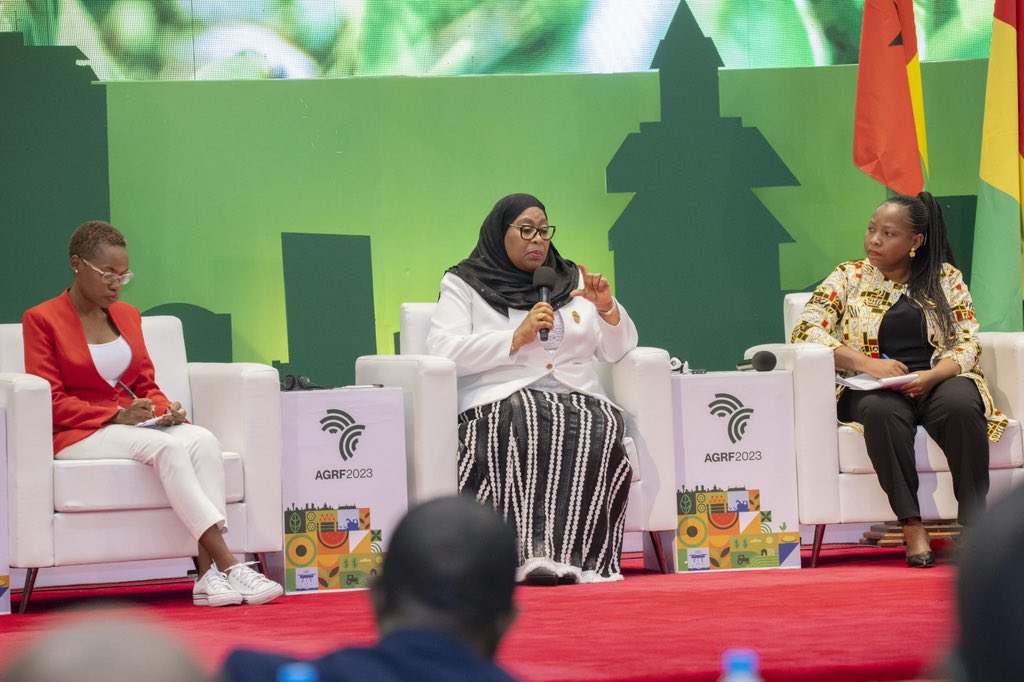- The role of Africa’s youth in agriculture and food systems transformation is a key focus area in this year’s annual Africa Food Systems Forum in Tanzania.
- President Samia cites access to information, land, capital, pest, and disease management as some of the challenges facing Africa’s Youth in agriculture.
- Youth are calling for government support in terms of technology, access, and data to empower young entrepreneurs in the agricultural sector.
In the heart of Dar es Salaam, Tanzania, the 13th annual Africa Food Systems Forum (AGRF) convened with one mission: to explore strategies that enable Africa to continue feeding itself and the world. Running from September5th to September 8th, under the theme “Recover, Regenerate, Act: Africa Solutions to Food Systems Transformation,” the AGRF 2023 is bringing together over 4,000 delegates, leaders, and innovators from across the globe.
Current and former heads of state from Tanzania, Kenya, Senegal, Burundi, Ethiopia, Zanzibar, and Nigeria have met to help tackle the pressing challenge of securing the region’s food supply.
One remarkable shift at AGRF 2023 was the role accorded to Africa’s youth in shaping the discussions and actions concerning agriculture and food systems transformation. Thus, Young innovators and farmers have taken center stage alongside heads of state, providing firsthand insights into the complex realities of farming in Africa.
In that regard, Tanzanian President Samia Suluhu Hassan amplified the youth’s voice in these critical conversations, recognizing their pivotal role in the agrarian revolution. Moreover, President Samia shed light on the challenges faced by Africa’s youth in the agriculture sector, including access to information, land, capital, pest and disease management, and the ever-pressing issue of climate change.
Radical overhaul of how Africa produces food
President Suluhu’s clarion call resonated with the need to harness these challenges as catalysts for policy change and a radical overhaul of the way Africa produces its food. Moreover, the Tanzania’s president emphasized the urgency of enabling the youth to farm in alignment with global food market demands, recognizing their potential to drive transformative change.
Consequently, during a “Youth Townhall” discussion, young trailblazers engaged in a compelling dialogue with President Samia. Ms. Nancy Iraba, Co-Founder and CTO of Healthy Seaweed Company Ltd in Tanzania, articulated the importance of partnerships and collaboration among youth in agribusiness.
Ms. Iraba advocated for the promotion of aquaculture farming along Africa’s nearly 30-kilometer shoreline, calling for government support in terms of technology, access, and data to empower young entrepreneurs in the agricultural sector.
President Samia echoed the significance of the blue economy, drawing lessons from Zanzibar’s successful use of technology to maximize the potential of seaweed production, even in fields such as medicine and cosmetics. Furthermore, she underscored the role of technology in tracking progress and improvement within the agriculture sector.
Jhanira Rodriguez Torrez, representing the United Nations Sustainable Development Solutions Network, Bolivia, emphasized the importance of technology for tracking advancements in agriculture development.
Using technology to register farmers
The Tanzanian president affirmed her commitment to using technology to register farmers nationwide, collect essential data, and provide tailored extension services. She also highlighted the implementation of smart irrigation technology.
Addressing concerns about market access and distribution, President Samia outlined Tanzania’s approach of leveraging cooperative unions to connect farmers directly with buyers, eliminating middlemen and ensuring better prices for produce.
The development of infrastructure was highlighted as vital for transporting goods to local and international markets.
Hussein Bashe, Tanzania’s Minister of Agriculture, inspired African youth by drawing a parallel between the current economic liberation movement and the political liberation struggles of the past.
He encouraged the youth to seize the tools at their disposal to drive economic change. Tanzania is dedicated to following up on various priorities, including increasing sector budgets and promoting private sector participation, as outlined in the Malabo Declaration on Agriculture.
Dr. Mwatima Juma, Chairman of Tanzania Organic Movement (Toam), called for government support for youth organic farming businesses. This aligns with the commitment to expand the agriculture sector by at least 6 per cent and create job opportunities for youth by 30 percent, emphasizing chemical-free food production.
Read Also: Investing in Agriculture: Transforming Africa’s Food Industry
Translating promises into action
In the emerging field of herbs, such as cotmir and rosemary, organic farmer Mwanahamisi Hassan highlighted the immense potential for growth and sustainable agriculture. Ms. Iraba stressed the role of youth in holding leaders accountable for their commitments and ensuring that the promises made at the forum are translated into action.
The AGRF 2023 also witnessed significant progress in securing financial commitments for the youth agribusiness flagship program, Building Better Tomorrow (BBT). Multiple financiers, including the African Development Bank, the World Bank, AGRA, EFFAT, and USAID, pledged their support, affirming the growing recognition of the youth’s role in shaping the future of agriculture in Africa.
Under flagship Building Better Tomorrow (BBT) program for the next six years, the African Development Bank pledged $100 million, the World Bank $300 million, AGRA $40 million, EFFAT $60 million.
As Africa moves forward in its journey to transform its food systems, the youth have emerged as pivotal agents of change. They bring fresh perspectives, innovative solutions, and a burning passion to the field of agriculture.
Their active participation, as seen at AGRF 2023, offers a promising path towards a food-secure and prosperous Africa, driven by the hands and minds of its very own youth.
